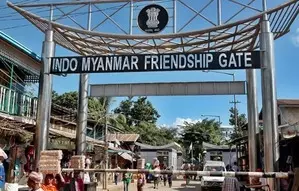Apex tribal body urges Centre not to fence India-Myanmar border in Naga community's interest

Kohima, Jan 9 The Tenyimi Union Nagaland (TUN), an apex body of five major tribes in Nagaland, has reiterated its support to the Nagaland Assembly resolution and urged the Centre not to fence the India-Myanmar boundary in the interest of the Naga community.
TUN President Kekhwengulo Lea said that the apex body strongly supported the Nagaland Assembly resolution adopted on March 1, 2024, urging the Union government to reconsider its decision to erect a fence along the India-Myanmar border.
He said that as the Naga community people are residing on both sides of the border, the fencing would disrupt cultural ties, social bonds, education, and healthcare access.
"Communities would be isolated, and vital connections would be cut off. The absurdity of this plan is starkly illustrated in bordering Longwa village, where the proposed fence would physically bisect the home of a Konyak Angh, with the kitchen in India and the bedroom in Myanmar," Lea said in a press statement.
He said that the TUN, during its 1st Foundation Day held at Kohima Village in June last year, had resolved, among several resolutions, to stand in solidarity with the resolution adopted by the Nagaland Assembly requesting the Union government to reconsider its decision to erect a border fence.
The TUN maintained that the proposed fencing threatens to further divide the Naga people and sever historical, cultural, and familial ties that have existed for centuries.
The decision to erect a border fence under the pretext of national security fails to consider the devastating impact on Naga lives and livelihoods, it stated.
"Families would be permanently separated, economic lifelines cut off, and vulnerable communities pushed further into poverty. TUN is the apex body of five tribes – Angami, Chakhesang, Pochury, Rengma and Zeliang.
The Ministry of Home Affairs (MHA) recently adopted a new scheme to issue a pass to the border residents of both India and Bangladesh living within 10 km on either side of the frontier to regulate cross-border movements.
The new scheme would replace the previously suspended Free Movement Regime (FMR), which earlier allowed citizens residing close to both sides of the India-Myanmar border to move 16 km into each other's territory without a passport or visa. Manipur and Mizoram governments initiated the process following the directives of the MHA.
According to Manipur and Mizoram government officials, the pass would be issued to the border residents of both countries on submission of government documents confirming that they live within the territorial limit of 10 km on either side of the border.
"State police, health officials and Assam Rifles would monitor the system. A designated officer of the Assam Rifles would issue the passes based on the official documents of the border residents. The pass would be valid for one week for specific purposes such as visiting relatives, tourism, business, medical needs, sports, official duty, border trade affairs, attendance in seminars or conferences and cultural exchange programmes,” the official said.
At least ten tribal organisations in Manipur, including the influential Indigenous Tribal Leaders' Forum (ITLF), on Sunday once again urged the Centre not to fence the India-Myanmar border and not to scrap the Free Movement Regime (FMR).
The tribal organisations in a joint statement said that if the fencing is done along the India-Myanmar border and the FMR scrapped, then it would not be possible to maintain social, cultural, and economic ties between tribal communities who live on both sides of the border.
Four northeastern states -- Arunachal Pradesh (520 km), Manipur (398 km), Nagaland (215 km), and Mizoram (510 km) -- share a 1,643 km unfenced border with Myanmar. Out of four northeastern states, which share borders with Myanmar, only works for fencing of the 20 km of the mountainous borders with Manipur are now underway. The entire 1,643 km porous India-Myanmar border, known for the smuggling of arms, ammunition and narcotics, will be fenced at a cost of Rs 31,000 crore.
Source: IANS